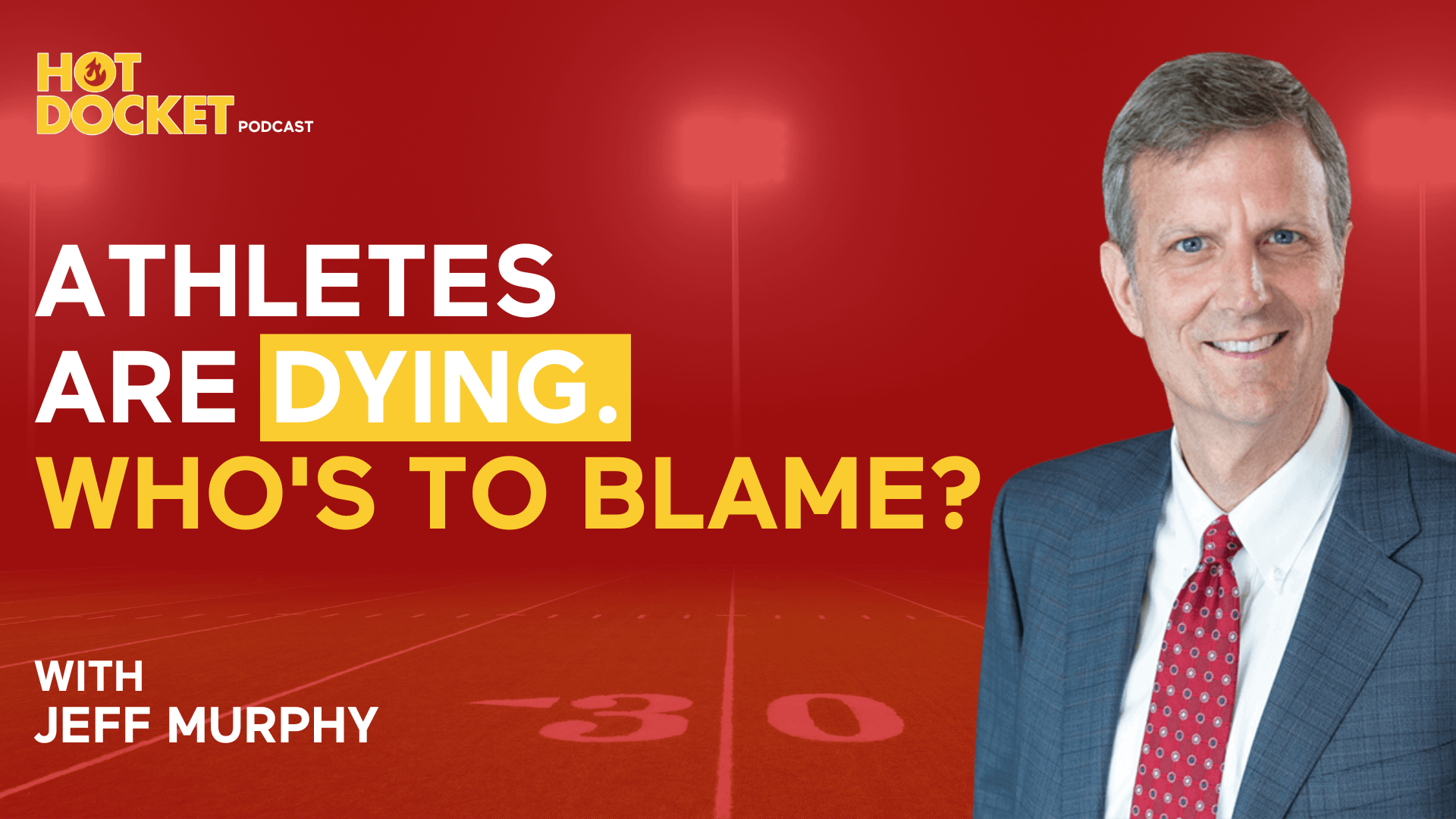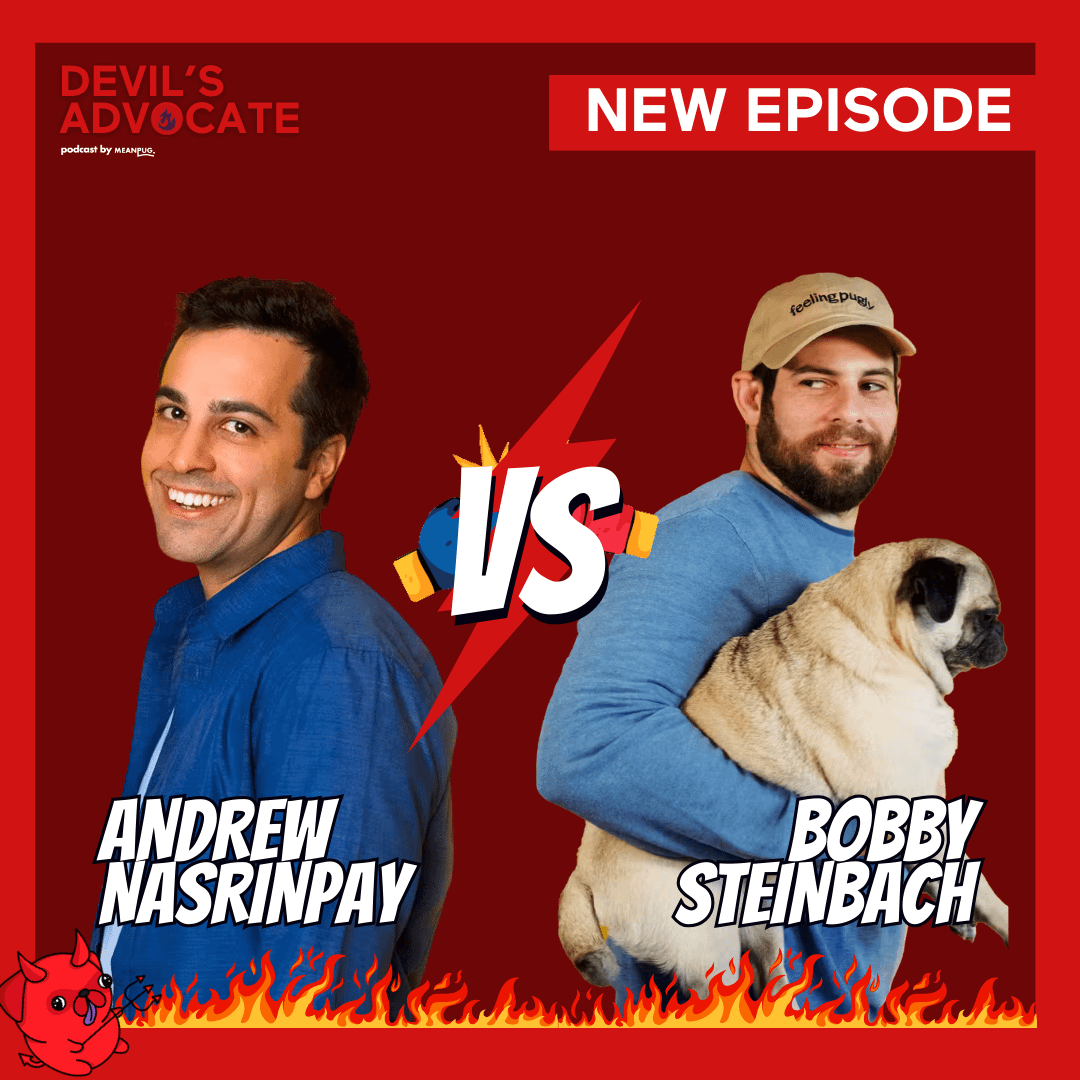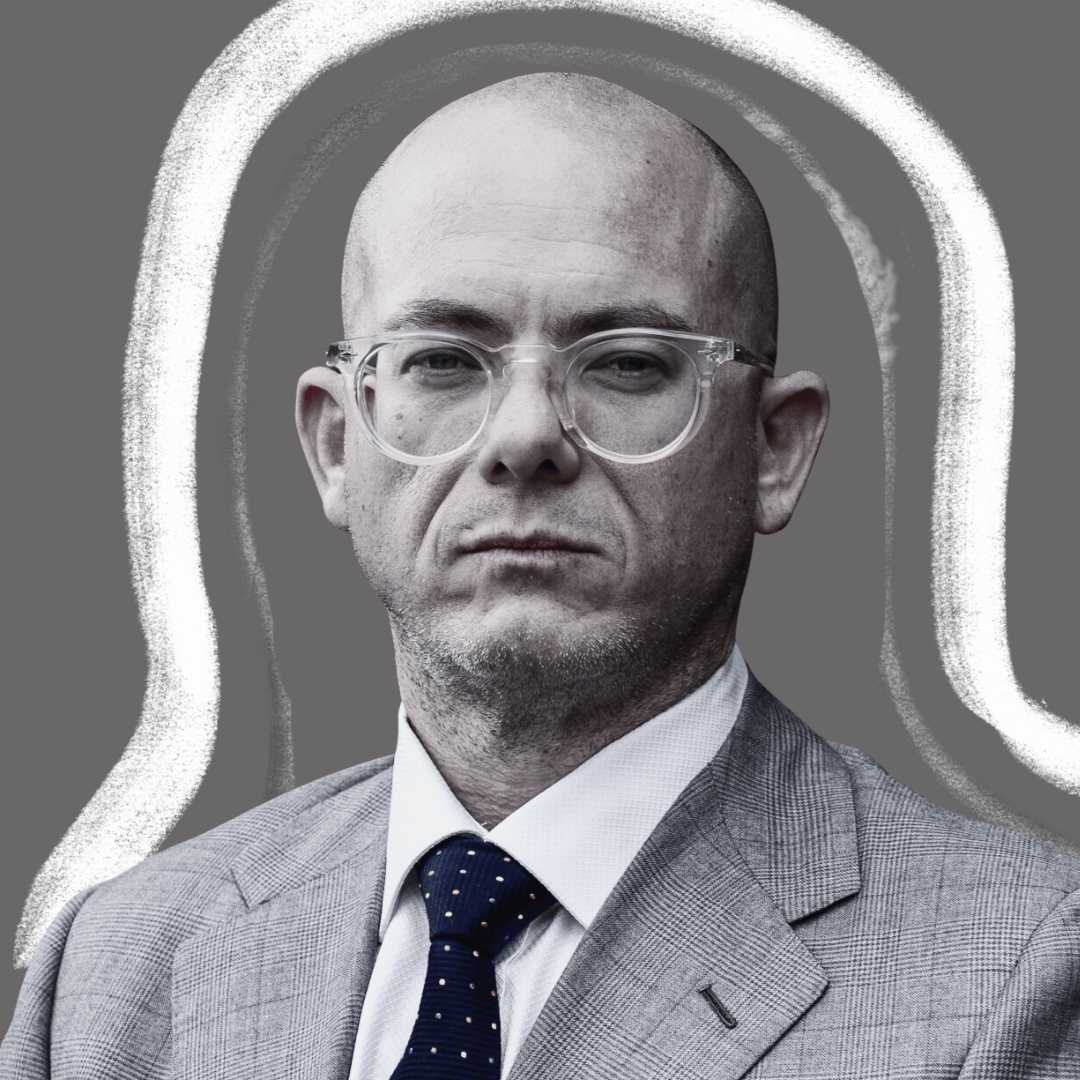[00:00:00] Jeff Murphy:
You know, if you’re playing football, you took care of your ACL or you sprain an ankle or you get a concussion, well that’s, that’s a known accepted risk of playing football, but being run to death during practice when you’re struggling, um, and coaches are watching you and screaming at you to continue on, that’s not a risk.
[00:00:18] Jeff Murphy:
That’s inherent. Slip ball.
[00:00:20] Bobby Steinbach:
Welcome to Hot Docket, the show where we talk about winning marketing strategies that have built the most successful law firms.
[00:00:25] Andrew Nasrinpay:
Join us every two weeks for the latest trends and tactics to grow your law firm. Welcome to the Hot Docket. We’re here today with Jeff Murphy and we’re gonna talk about personal injury.
[00:00:36] Bobby Steinbach:
You started with the intro. That’s unusual.
[00:00:39] Andrew Nasrinpay:
Yeah. Okay.
[00:00:40] Bobby Steinbach:
Well, I’m excited and, um, I’m gonna let Jeff speak a little bit more about it, but, um, I. I, it’s something I’ve never heard of as like a specialty.
[00:00:54] Andrew Nasrinpay:
Can you tell us a little bit about, uh, the sports death related cases that you’ve seen over the years?
[00:01:01] Jeff Murphy:
Yeah, yeah. No, I appreciate it, guys. I, I appreciate the opportunity to be on here and, and, um. You know, I could go on and on, uh, on this topic, so please raise your hand or stop me whenever you feel like we need to go in a different direction.
[00:01:16] Jeff Murphy:
But I’ve been, um, I, I’m a, a lawyer in Tampa, Florida, doing only personal injury. I’ve been doing it for 35 years now, and I handle a lot of auto cases, um, you know, car accidents, truck accidents, slip and falls. Construction accidents, you know, the, the, the typical cases that you would think, uh, that involve personal injury I handle.
[00:01:41] Jeff Murphy:
But I have also, over the last 15 years or so, developed kind of a niche with I. Uh, sports injury or sports death cases? Um, I’ve had about seven different cases all over the country from south, uh, South Carolina, to California to North Carolina, and then several here in Florida that involve the death of student athletes.
[00:02:09] Jeff Murphy:
A couple of them have been high school football players, uh, but the majority of them have been college football players. Um, and. Typically what you find is that, you know, it’s, I don’t know if either of you guys ever played sports, but you know, you’re a little bit younger than I am, but if you go back to the day, um, you know, in, in the old days when the coaches were just relentless on the players, you see movies about it and that kind of stuff about how over the top some of these coaches are, and it’s getting a little bit better, but it’s still, it still exists.
[00:02:44] Jeff Murphy:
You know what you, you have situations where the players. Come to camp, you know, after summer break or they’re, or they go home for Christmas break or they go home for spring break and then they come back and a lot of the coaches, for whatever reason, seem like they want to, you know, punish, uh, the kid, um, for having time off or, or whatever.
[00:03:08] Jeff Murphy:
And, and so in every single one of our cases, what I noticed was. They all occurred during conditioning. Okay. At the beginning, um, of the conditioning period. So whether it’s when the two a day start in August, you know, before the season, or they go away for spring break and they come back for spring practice at the very beginning of that, it’s always during conditioning drills when they’re not acclimated.
[00:03:40] Jeff Murphy:
You know, when they’re not quite in shape yet, that’s when they really run into trouble. It’s never during a practice during the season, you know, once the games start, it’s never during a game. It’s always during these, you know, they used to call ’em kind of, uh, uh, where they call ’em mat drills back in the day where they, they get you in these rooms and they put you on these mats and it’s just relentless.
[00:04:05] Jeff Murphy:
And the kids aren’t acclimated and aren’t used to, to, um. You know, they’re, they’re not in shape yet. And so it really puts them at great risk, especially bigger kids, kids who aren’t as good in as good a shape, you know, lineman type kids. A couple of our cases involved sickle cell trait, which is, um, not always, but it’s lar by and large, um, a condition that African American football players have and it can predispose them.
[00:04:37] Jeff Murphy:
To, uh, a sickling event. And what that means, it’s not like having sickle cell disease, okay. Or sickle cell anemia, which we’ve all heard of. They only have one of the genes. They don’t have both, so, so they only have the sickle cell trait. But what happens is when their bodies get put under an extreme amount of stress, the blood cells can.
[00:05:01] Jeff Murphy:
Form into a sickle shape, almost like a crescent moon shape, and they get clogged up in the bloodstream and they don’t reach the organs and the player will, you know, it’s not a situation where in, in, in, in most of our, and this will be the last thing I say, and then I’ll let y’all ask some questions, but, um.
[00:05:22] Jeff Murphy:
You know, it, it, it’s, it’s not a situation where, I don’t know if you, if you remember, Hank Gathers, um, a basketball player. He’s run, he’s a college basketball player years ago, running down the court, boom, collapses and, and dies. Um, that’s not what sickle cell trait looks like. That’s not what heat exhaustion looks like.
[00:05:41] Jeff Murphy:
That’s sudden death from a heart, from a cardiac condition. That’s what, that’s what Hank gathers had. God bless him. Or Len Bias. I’m sure you, you heard about Len Bias, but, um, with the sickling event or with a heat exhaustion event, the player is struggling for a period of time, right? He’s, he’s exhibiting signs of struggle and real issues and, you know, the coaches, um, and a lot of times it’s the strength coaches, the strength and conditioning coaches.
[00:06:14] Jeff Murphy:
You know, think sometimes that the player being a, I’ll put it nicely, a wimp. Um, and so they’re screaming at ’em to get back up and continue while they’ve got these medical issues going on. And, and that unfortunately, um, can result in very serious injuries and or death. So, um, we have had, ev every single case that we have had, has had a successful outcome for the family.
[00:06:43] Jeff Murphy:
So that’s been something that I’ve done and I’ve, I’ve really enjoyed that line of work.
[00:06:46] Bobby Steinbach:
How did these cases work from like a waiver standpoint? Because I imagine the very first thing these players do is sign a waiver that says something like, there’s danger inherent, there’s risks inherent. I know this is kind of the way that like ski resorts out west get away with it, is they,
[00:07:04] Jeff Murphy:
yep.
[00:07:04] Bobby Steinbach:
You just sign away your rights. So how does it, how does it work for this?
[00:07:08] Jeff Murphy:
That’s a, that’s a great question. And in our very first case that we had in Orlando against the University of Central Florida, um, there was a waiver, um, but it was number one, it was buried in like a. 10 page document. Um, it, it wasn’t clearly a release and waiver of all your rights.
[00:07:28] Jeff Murphy:
You know, it wasn’t the, the paragraph wasn’t even titled release and waiver, but it did have release language. Um, but the court held that that would, because it was buried in the document, that that was not a knowing waiver, uh, by the, by the student athlete. And the other thing is, most of those releases will say that we are releasing.
[00:07:48] Jeff Murphy:
The school from any claims relating to the risks inherent in football, right? So, you know, if you’re playing football, you tear your ACL or you sprain an ankle or you get a concussion, well that’s, that’s a known accepted risk of playing football, but being run to death during practice when you’re struggling, um, and coaches are watching you and screaming at you to continue on, that’s not a risk that’s inherent in football.
[00:08:15] Jeff Murphy:
So. Many times people do sign releases. Um, but there, there can be numerous ways to get around them. And we were successful in that case, in, in getting around the release, what we were not successful on. And we, we, we were also successful at trial. The jury awarded the family $10 million. Um, but unfortunately it was a case against, um, university of Central Florida, which is a state, uh, entity.
[00:08:43] Jeff Murphy:
And Florida has what’s called um. Limited sovereign immunity. And so the school, this is a whole nother issue, but I’ll just briefly mention it ’cause I find it interesting. The school, even though they’re a public school, created a private corporation to run their entire athletics department. Um, so we sued the private corporation, which was affiliated with the university.
[00:09:07] Jeff Murphy:
They had $21 million in insurance coverage. Uh, the Supreme. So, so after we got our jury verdict for 10 million and tried to collect, um, against that 21 million, the, uh, they appealed and, and argued that their corporation, even though it was a private corporation that they had set up because it was affiliated with the state and created by a state university that, that they also got the benefit of the immunity and the Florida Supreme Court agreed with them.
[00:09:35] Jeff Murphy:
So our $10 million. Verdict was reduced to $200,000, which, which is the cap, uh, in the state of Florida. So, but that didn’t stop us. We, we went on after that and, and like I said, we’ve had about six other cases that that ended up, uh, very well for the family.
[00:09:53] Andrew Nasrinpay:
Why do they have that structure where they set up a private entity?
[00:09:57] Jeff Murphy:
Yeah, great question. They’re called DSOs, uh, direct support organizations and, uh, universities will do it. Um. Primarily for, um, you know, there’s, there’s, what do they call it, the sunshine laws, uh, in Florida they call it the sunshine Laws, where everything’s kind of, if you’re a state entity, then you’re subject to all sorts of disclosures and all sorts of information that the public is allowed to get.
[00:10:26] Jeff Murphy:
When you create these d and, and you also have to jump through all sorts of hoops. When you wanna bid something out, you wanna hire somebody to do something, you gotta put out open bidding and let all these people come. And because you’re a state entity and allow all these people compete for the bid.
[00:10:40] Jeff Murphy:
When you, when you set up a DSO or private corporation, you don’t have many of those limitations. People can’t get all your records and documents with the public records request. Um, you don’t have to jump through all these hoops when you’re trying to, to. Do construction or bid things out, you can just kind of do it without having to go through all those obligations that are imposed on the state.
[00:11:02] Bobby Steinbach:
When you’re handling a case like this, how are you getting around? Like, I think a common objection, which is what, how can you tell the difference between somebody who’s been pushed too hard and somebody who’s being pushed to the edge of their limit? Right? Like it probably looks the same to a coach, somebody struggling.
[00:11:19] Bobby Steinbach:
Yeah. How do you kind of address that Objection.
[00:11:23] Jeff Murphy:
Yeah, well, you know, first of all, you have to have, um, a great athletic trainer, athletic training staff, and you gotta have coaches who listen to the staff. Okay? And, and that’s, that’s where the disconnect is because a trainer, no matter how good he is as a trainer, if he’s afraid of the coach.
[00:11:49] Jeff Murphy:
Um, or doesn’t wanna speak up to the coach, or the coach is too intimidating, which many of these coaches are. I mean, they’re type a hard charging guys, successful, strong, um, you know, and it’s hard sometimes to tell them, to go to them and say, Hey, this guy needs to sit out. The trainer might get, the trainer might get worried that he’s gonna get fired.
[00:12:11] Jeff Murphy:
Um, so the lack of communication between the, the training staff and the coaches is a big problem. But, um, the, the answer to your question, number one, we, we’ve had a, a couple of our cases where the players had sickle cell trait. The trainer who was on the field did not know. Hmm, okay. There were other trainers who knew because the kid, they test all these kids.
[00:12:35] Jeff Murphy:
Now, when they come into college, they test ’em right when they start to see whether they’ve got this sickle cell trait. And this, this kid in Orlando, God bless him, Eric Planter, was just an outstanding, outstanding young man. Um, tested positive for sickle cell trait, and it was in his file. But the trainer who was on the field at the time was unaware.
[00:12:56] Jeff Murphy:
So when he saw him struggling. He, he was a wide receiver. Okay. So he wasn’t a big heavy set offensive lineman or something like that. Uh, when he saw him struggling, he figured the kid was just outta shape. He had no idea that he had sickle cell trait. Hmm. And so, um, but I think that you will, in all of these cases, when we have taken depositions of the teammates who were at the practice.
[00:13:22] Jeff Murphy:
They have all made it clear, um, in every one of our cases that the struggle was not, that you could clearly tell when somebody’s gasping for air and they’re tired versus when somebody’s about to die and going through a five or a 10 minute or 15 minute process of real, you know, life and death struggle and, and it impaired.
[00:13:43] Jeff Murphy:
The problem with it is it impairs, you know, the, the, the kids, uh. Cognition, you know, his ability to think for himself and he is getting yelled at. And, and, and most of these kids, you know, great players and great teammates, a lot of ’em are very compliant. I mean, they wanna please their coaches, right? I mean, they wanna start, they wanna be on the field, so they’re not gonna quit for anything.
[00:14:03] Jeff Murphy:
If you’re yelling at ’em, they don’t know they’re dying, you know, and you, and you, you put on top of that, the fact that these, you know, especially heat exhaustion can really mess with your mind. Um, you can even start hallucinating that can really affect the player’s ability to stop on his own. So the long, the long answer to your short question is that, you know, the, the, the players have all said that there was a not a notable difference between the struggle.
[00:14:28] Jeff Murphy:
They saw these, these kids who were dying versus just a normal struggle during a practice.
[00:14:34] Andrew Nasrinpay:
Does the sickle cell um, issue also impact, uh, kids who are younger? So let’s say high school, middle school, anything like that? Yeah. Or does it only like kick in once they, they get a little bit older?
[00:14:47] Jeff Murphy:
No, absolutely.
[00:14:48] Jeff Murphy:
Absolutely. It can happen to ha it has happened in high school, um, and it’s happened in, in numerous, uh, numerous colleges. Simply because you’re pushed harder typically in college. I mean, that’s, that’s the real reason for it. I think where you see more of it in college and a lot of it, there, there have been situations where, you know, eight or 10 people have come down with, um, with not from sickle cell trait, but from over exertion.
[00:15:18] Jeff Murphy:
They, they get. They get a condition called rhabdo myosis, which basically eats up your muscle tissue and your kidneys and causes all sorts of trouble. Those, that incident with all those kids that they all survived, thank goodness. But yeah, the, the generally, I, I think 99% of the time the kids are just pushed that much harder in college.
[00:15:39] Jeff Murphy:
So a kid who, a kid might have sickle cell trait and go through his whole high school career and never have one issue, um, and not even know about it really. Until he goes to college and he’s tested and he finds out about it.
[00:15:51] Bobby Steinbach:
Does any part of you think that it might be that in high school communities are closer, people don’t want to, you know, go after the coach who is also the, you know, the deli store clerk or what have you, and that might be the reason why you see more prevalence of these lawsuits at the college level?
[00:16:13] Jeff Murphy:
Well, yeah, I mean, I think that goes hand in hand with, right. I mean, I, I don’t know if you guys played high school sports. I played high school and I played some college and, and high school was fun. It was a blast. College is a business. It’s all about money. So just by its very nature, um, they’re being pushed.
[00:16:35] Jeff Murphy:
They’re being pushed so much harder than, than almost every high school in the country. So yeah, I think, I think what you said is right there is a little bit of a community there. People actually seem to care about each other more. Um, and, and in college they may very well care about you, but they also care about their jobs and make it keep continuing to make the money that they’re making and putting a winning team on the field.
[00:16:57] Jeff Murphy:
That’s how they keep their jobs.
[00:16:59] Bobby Steinbach:
I’m actually saying something a little bit different because. What is is a little disconnected to me is high school. There’s gonna be a wider variance of, um, fitness level. Like there will probably be more people who are more outta shape. So I would think the prevalence of like people being pushed too hard could be as high or higher, but people.
[00:17:21] Bobby Steinbach:
Like parents or you know, who, whomever don’t necessarily want to go the legal route when something happens because it’s a tight community. Everyone knows everyone, so on and so forth.
[00:17:33] Jeff Murphy:
Yeah, I hear you. No, I, I am actually, in addition to, um, being a. 35 year personal injury lawyer. I’m actually, this is my 17th year of, uh, being a volunteer high school football coach.
[00:17:48] Bobby Steinbach:
Oh, nice,
[00:17:48] Jeff Murphy:
nice. So I do that as well. And I think that you’re absolutely right. The high school kids are. Not nearly in as good a shape as, as the college kids, especially the kids kids who aren’t gonna go on and play at the next level. Um, but because of that, and, and, and I’ve seen quite a bit of heat issues, especially here in Florida.
[00:18:12] Jeff Murphy:
Um, but we have a very good trainer. Our training staff is great, and the kids who are not going to the next level, by and large. Aren’t pushing themselves the same way. Um, you know, it’s, it’s just, I just haven’t seen that. Um, and so, you know, I, I, I do think that I have probably seen more cases of kids struggling in high school than I, than I did in college.
[00:18:44] Jeff Murphy:
Uh, but not to the level of struggle because we’re, well, our, our school’s probably a little bit different. We got like 15 coaches out there at any one practice. We have a lot of people out there, so everybody’s keeping an eye on somebody. But you bring up a really good point. I just haven’t, it, it, it, even though some heat related issues may start, it stops way before it gets to, to, uh, you know, a serious level.
[00:19:09] Jeff Murphy:
And knock on wood, I hope that always continues.
[00:19:12] Andrew Nasrinpay:
So take, take your lawyer hat off for a second and put the coach hat on. Can you tell us a little bit about what the signs actually look like? So the difference between a kid who’s struggling because he is outta shape and somebody who’s actually going through, uh, serious heat exhaustion, heat stroke, uh, the sickle cell issue you’re talking about.
[00:19:33] Andrew Nasrinpay:
Can you, can you describe in detail what that looks like?
[00:19:36] Jeff Murphy:
Yeah. We actually, in, in one of our cases, our expert. Had a video of an army, um, of a, of a, uh, a military kid who was in a training, um, protocol and had sickle cell trait, and they actually have him running his conditioning drill while he’s sickling.
[00:20:05] Jeff Murphy:
He, fortunately, he did not die. They, you know, they were able to. Save him before, but it, it looked like, it looked like somebody running in slow motion or in quicksand. Um, it was, and, and, and, and just really not just tired and gasping for air, but like really struggling with his movements. Um. It really just like slow motion and, and it, it, it was, it’s all I can say is like nothing I’d ever seen before.
[00:20:40] Jeff Murphy:
Uh, and I’ve seen a lot of kids out on football fields throughout the years, gasping for air, tired, you know, exhausted. If, if you wanna say that, even some hyperventilating. But I’ve never seen anything like, um, what I saw, and, and that goes back to what I said earlier about the teammates of these players who I’ve represented.
[00:21:01] Jeff Murphy:
Um, I. You know, all saying that they, they saw things that even they knew with, you know, an untrained medical eye, uh, or, or a non-medical eye, that they knew that something was seriously wrong.
[00:21:18] Andrew Nasrinpay:
Hmm. Do you know the prevalence, uh, of that genetic trait?
[00:21:25] Jeff Murphy:
I don’t, I would say that there, there are all sorts of studies out there and I knew that, I knew the answer to that at one time, but I would say, you know, um, in my experience it’s been like you got a team of 50 or 60 kids, two or three of them.
[00:21:41] Andrew Nasrinpay:
Okay. So it’s it’s still pretty, pretty prevalent.
[00:21:44] Bobby Steinbach:
Meaningful amount.
[00:21:45] Andrew Nasrinpay:
Yeah.
[00:21:46] Jeff Murphy:
Yeah, yeah. It’s made, they have the, the NCA has actually come out with. A chapter on sickle cell trait, um, for medical staff and for coaches to, to read. So it’s, it’s a very, even though it’s not common, it’s well known enough that it’s, it’s treated very seriously by the NCAA.
[00:22:07] Bobby Steinbach:
So those seven, or I think you said seven or showcases that you’ve had, going back to 2010, how’d you get those cases?
[00:22:13] Bobby Steinbach:
How’d people find out about your firm?
[00:22:15] Jeff Murphy:
Um, so. The, you know, the first one in Orlando? I don’t know. Um, I was with a prior firm and I don’t know how that came in, but once we had success with that, um, and we got the, we got the, well, we had success, at least as far as the jury verdict goes. That was pretty well publicized and, um, we used experts in that case.
[00:22:44] Jeff Murphy:
And so our, our, our name just kind of got out there a little bit. And so other families, when this thing happened, I don’t know if they Googled, I don’t know exactly how they found us, but they reached out to us because of our experience with these prior cases.
[00:23:02] Bobby Steinbach:
I think it’s a point towards like niching down, who’s that guy in Miami?
[00:23:06] Bobby Steinbach:
Who, like all he does is building collapse. You know who I’m talking about?
[00:23:10] Andrew Nasrinpay:
Yeah. They, they, they’re actually ma
[00:23:12] Bobby Steinbach:
Mati or something.
[00:23:13] Andrew Nasrinpay:
It, it’s, uh, actually in Philly it’s Monesi or something. Mongo or
[00:23:17] Bobby Steinbach:
Mongo. Letti. Yeah. I think there’s something too, even if it comes in your door accidentally, like once you’ve found a niche, it’s gonna pay dividends even if, you know, you didn’t go out intending to find it.
[00:23:29] Bobby Steinbach:
Um,
[00:23:30] Jeff Murphy:
yeah, no, I get, I get calls from other lawyers around the country who have, um, similar cases and they’ve actually called us, um, a couple of times they’ve gotten us involved, but a couple of times they just wanna pick my brain and see if they’re doing the right thing and that sort of thing. So, yeah, it, it has definitely been, and, and I’m glad I, I love the work.
[00:23:52] Jeff Murphy:
It’s, it’s very rewarding. Um, but. Uh, in a way I’m also glad that I haven’t gotten any more cases recently because that means that hopefully means that there’s not a lot of this kind of stuff happening anymore. It’s really over the last 10 to 15 years, uh, really over the last 10 years, it’s gotten a lot better with, with the coaches and the strength and conditioning staff.
[00:24:15] Bobby Steinbach:
Yeah, I’m sure those are incredibly hard cases.
[00:24:17] Andrew Nasrinpay:
Um, it, it seems like you’ve had good success at trial, but then you’ve got the issues with like immunity. I, is that the hardest part about some of these cases and is that like a common theme where it’s structured in a way where it’s actually hard to collect even when you get a jury verdict?
[00:24:36] Jeff Murphy:
Yeah. Well, it totally depends on the state, right? So Florida is one of those states, um, that, that has a cap. South Carolina also has a cap, but it’s higher. Um, it’s closer to a, it, it’s less than a million, but it’s much more than 200. We had a case out in California against Cal Berkeley, um, where they had no, California had no caps.
[00:24:58] Jeff Murphy:
So it really depends on the state. Um, but yeah, you have a, you have a real problem, you know, in Florida if, if you get hit by, you know, if you get this, this, this Eric planter who died. Playing football at the University of Central Florida, or, or if you’re driving down the road and you get hit by a, a state, a DOT worker, uh, who’s driving a pickup truck and runs you over and kills you.
[00:25:22] Jeff Murphy:
Um, in Florida, you’re capped. I mean, you get 200 grand and that’s it. Now, there, there is something called a claims bill, which is very difficult to get, but, um, you can petition the legislature. Let, let’s say you have a case and you go to trial and you get a. $5 million verdict. Um, and, and, but there’s a $200,000 cap.
[00:25:46] Jeff Murphy:
You can petition the legislature to, uh, pass what’s called a claims bill, authorizing you to collect on that claim. Um, it usually takes unusually sad circumstances for the legislature to grant a claims bill. You know, they typically won’t do it in just a run of a mill case. But if, if it’s an egregious case and, and the the circumstances are extremely tragic, then sometimes you can get those passed.
[00:26:17] Jeff Murphy:
But that’s a long, long road to hoe.
[00:26:22] Bobby Steinbach:
Okay. I think, um, that’s a pretty good place for us to, uh, to stop for today. Jeff, I don’t know that we were going into this expecting to talk entirely about sports death related cases, but. It was, it was pretty fascinating. So we ended up spending our time here. Um, thanks again for coming on our show and, uh, is there anything else that, you know, you want listeners to, uh, check out or hear or what have you?
[00:26:50] Jeff Murphy:
No, I think that’s it. I mean, I, I’m, I was happy to share my experiences and I’m, and I’m always happy to speak with anybody who has questions about these types of cases or really any personal injury case. You can reach out to me, gimme a call, shoot me an email. And I’ll be happy to answer any questions. I, I really appreciate the opportunities, guys, and I, I look forward to doing it again.
[00:27:08] Bobby Steinbach:
Thanks, Jeff. And we’ll put your, your, um, info and links and all that good stuff in the show notes. So folks have you easy access. Uh. See everyone on the next Hot Docket. We hope you’ve enjoyed this episode of Hot Docket. We’re your hosts, Bobby and Andrew, founders of Meme Pub, the marketing agency for ambitious law firms.
[00:27:27] Andrew Nasrinpay:
Have questions about marketing or anything we covered today? Email us at bark@memepub.com.











